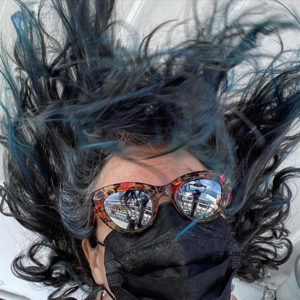Bio

Dr. Mary Elizabeth (“M.E.”) Luka is Assistant Professor of Arts and Media Management, University of Toronto, where she examines modes of co-creative production, distribution and dissemination in the digital age for the arts, culture, media and civic sectors. Dr. Luka holds a Connaught New Researcher Fellowship analysing creative networks and partnerships in Canada, the UK and Australia. Dr. Luka is a founding member of the Critical Digital Methods Institute at UTSC, of NiSTS (http://www.narrativesinspaceandtime.ca/) and co-applicant on Archive/Counter-Archive: Activating Canada's Moving Image Heritage (https://counterarchive.ca/), a six-year national partnership involving universities and cultural organizations in marginalized and underrepresented media archives. M.E. was trained as a video artist and worked for many years as a director and producer of arts documentaries.
https://www.utsc.utoronto.ca/acm/mary-elizabeth-luka
Questionaire
Why did you get involved in this project?
I’ve always loved exquisite corpse projects and love Midi Onodera’s work. I was also struggling with processing all that was happening around the COVID-19 developments and saw this as a creative way to do so.
Did the one week turn-around for the work help or hinder your creativity?
The one-week turnaround was a great creative parameter to set. It forced me to make decisions quickly and respond to the material without overthinking it. I will say, however, that as the project went on, the later projects I worked on were given a bit more time, and I was able to accomplish something else with those – something a little more thoughtful. Kind of like gaining distance on the panic-inducing early days of COVID-19.
How did you feel about working on a project where you didn’t know who you were collaborating with?
It was intriguing to be working on a project where I didn’t know who was involved. The process was short enough that I didn’t ever have to wait very long, and I really liked being able to exchange a few words with others involved afterwards.
Has being involved in the project changed your thoughts on creativity?
Being involved in the project hasn’t changed my thoughts on creativity so much as it has given me another experience to draw on for future reference, and an opportunity to flex those muscles again. It was also a really helpful way to process what was happening in the world—reinforcing what I already think about creative work, which is that it is a language that we do not use enough to make sense of the world.
If you worked on several videos, what kept you coming back for more and how many did you do?
My involvement in several videos was prompted by my desire to sharpen my editing skills again and to return to some of the research-creation practices that I have used in previous work. This time, though, I was interested in reframing these practices within a critical autoethnographic lens. At the same time as I was involved in EXC-19, I was also working on a 21-day autoethnographic project with Annette Markham and Anne Harris (https://futuremaking.space/project/massive_micro/) that focused on macro and micro reflections about COVID-19. Working on editing within the EXC-19 video-making process placed me precisely at the location that I needed to be to ‘see’ both the micro and macro.